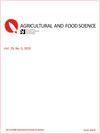带状种植能否在增产的同时降低害虫活动密度和危害?有机甘蓝和蚕豆的案例研究
IF 1.1
4区 农林科学
Q3 AGRICULTURE, MULTIDISCIPLINARY
引用次数: 0
摘要
本研究评估了白甘蓝(Brassica oleracea)和蚕豆(Vicia faba)带状种植如何影响害虫--钻心虫(Plutella xylostella)和跳甲(Phyllotreta spp.)该装置包括三块 270 平方米的地块,分别代表蚕豆和卷心菜的单作物,以及一块两者交替种植的地块。该装置于 2018 年和 2019 年建立。通过黄色粘虫诱捕法确定木虱的活动密度,通过坑式诱捕法确定蚜蝇的活动密度。收获时测定了作物产量,还评估了甘蓝叶片的叶面损伤情况。结果表明,条状种植降低了 P. xylostella 的活动密度,但对 Phyllotreta spp 没有抑制作用。条状种植地块的卷心菜叶片平均受损程度较高,但 2018 年的产量也较高。两年中,条状作物地块的蚕豆平均产量都较低。我们的研究结果表明,甘蓝-蚕豆带状种植有可能降低木虱(P. xylostella)的活动密度,但不会降低蚜虫(Phyllotreta spp.)的活动密度,并在总体虫害压力适中的情况下提高甘蓝产量,但这是以蚕豆产量为代价的。该案例研究表明,在北方条件下,芸薹属蔬菜-豆科植物带状种植系统具有抑制害虫的潜力,但需要注意作物的农艺兼容性,以确保与单作物系统相比,具有相似或更高的产量。本文章由计算机程序翻译,如有差异,请以英文原文为准。
Can strip cropping reduce pest activity density and damage while increasing yield? A case study of organic cabbage and faba bean
This study assessed how strip cropping white cabbage (Brassica oleracea) and faba bean (Vicia faba) affects the activity density of pests – diamondback moth (Plutella xylostella) and flea beetles (Phyllotreta spp.) – and how this affects crop yields. The setup consisted of three 270m2 plots representing monocrops of faba bean and cabbage, and a plot of alternating strips of the two. The setup was established in 2018 and 2019. Activity density of P. xylostella was determined through yellow sticky trapping and Phyllotreta spp. activity density was determined by pitfall trapping. Crop yields were determined at harvest, and foliar damage to cabbage leaves was also assessed. The results showed that strip cropping reduced the activity density of P. xylostella, but no suppression effect was observed for Phyllotreta spp. Average foliar damage to cabbage was higher in the strip crop plot, but in 2018 the yield was also higher. Average faba bean yield was lower in the strip crop plot in both years. Our results indicate potential for cabbage-faba bean strip cropping to reduce the activity density of P. xylostella but not Phyllotreta spp. and to increase cabbage yield when overall pest pressure is moderate, but at the cost of faba bean yield. The case study shows that a Brassica vegetable – legume strip cropping system has potential for pest suppression in northern conditions, but agronomic compatibility of crop plants needs attention to ensure similar or higher productivity than a monocrop system.
求助全文
通过发布文献求助,成功后即可免费获取论文全文。
去求助
来源期刊

Agricultural and Food Science
农林科学-农业综合
CiteScore
2.50
自引率
0.00%
发文量
22
审稿时长
>36 weeks
期刊介绍:
Agricultural and Food Science (AFSci) publishes original research reports on agriculture and food research related to primary production and which have a northern dimension. The fields within the scope of the journal include agricultural economics, agricultural engineering, animal science, environmental science, horticulture, plant and soil science and primary production-related food science. Papers covering both basic and applied research are welcome.
AFSci is published by the Scientific Agricultural Society of Finland. AFSci, former The Journal of the Scientific Agricultural Society of Finland, has been published regularly since 1928. Alongside the printed version, online publishing began in 2000. Since the year 2010 Agricultural and Food Science has only been available online as an Open Access journal, provided to the user free of charge. Full texts are available online from 1945 on.
 求助内容:
求助内容: 应助结果提醒方式:
应助结果提醒方式:


